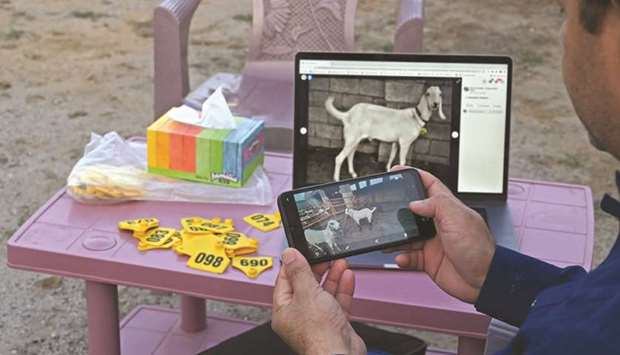Charitable trusts, mosques, madrasas and welfare organisations had already been flooded with bookings for collective qurbani or sacrifice (especially for cows) beyond their capacity before the government’s July 22 decision that encouraged organised mass sacrifice of animals and banned slaughtering on the road. In some places, bookings have doubled over last year.
Religious leaders had also requested people to opt for a collective sacrifice option when there was growing uncertainty whether the government will allow or ban the ritual on roads to control coronavirus cases.
Meanwhile, consumers were also puzzled as to how to manage qurbani while complying with standard operating procedures (SOPs) to
prevent the spread of Covid-19.
Covid-19 has changed the dynamics of collective qurbani this year, forcing operators of collective sacrifice to increase their purchase of animals to meet demand.
Some organisations are opting to sacrifice animals at slaughterhouses or remote places and then distributing the meat at the original premises. Others are trying to manage within their premises while following government SOPs. As is practice, consumers also bear the higher cost of the rising fee of butchers, feeding cost of animals and labour charges for keeping animals for a longer period before Eid.
There are a number of reasons behind the extraordinary growth in the trend of collective qurbani this year.
Rising food prices and utility tariffs have squeezed buying power, forcing many consumers to opt for one cow share.
People returning to Pakistan after losing their jobs in the Middle East or other countries have limited cash in hand and hence prefer a share of a cow instead of purchasing an entire animal.
People living abroad used to make online booking of animals and request organisations to distribute meat among the needy.
Market watchers feel that the volume of animals in residential areas has remained low just days before Eid al-Adha, while consumers made a beeline for trusts and organisations to get a share in cows on the first day with many failing to get it.
Market watchers feel that the volume of animals’ arrival at the residential areas has remained very low eight days before Eid compared to last year.
In contrast, consumers are making a beeline towards trusts and organisations to get a share in cows on the first day while many of them have failed to get it.
Unemployment, ailing financial health and fear of coronavirus have forced people to opt for collective sacrifice instead of individual sacrifice.
“For the first time, my family has avoided animal sacrifice at home and booked a cow and few goats at a reputed trust as my father does not want to risk children and other family members catching the virus from butchers,” a resident of Block 7 Gulshan-e-Iqbal, Mashood Ali Khan, said.
Qazi Syed Sadruddin, director, Ijtimai Qurbani at Al Khidmat Karachi, said, “Because of the rising demand, we will slaughter 30,000-40,000 cows for collective sacrifice this year at 125 different centres in Karachi as compared to 20,000-25,000 cows last year.”
The price of a cow share has increased by Rs500-1,000 to Rs11,000-13,000 depending on the area in Karachi. “We had to close first-day booking 15 days ahead of Eid whereas we had been taken bookings three to four days ahead of Eid in 2019,” Qazi said.
Mohamed Ghaazal, chief operating officer, Sailani Welfare Trust, said the number of cows has increased to 4,000 from 2,200, and the number of goats has jumped to 6,000 from 4,000, compared to last year. One goat costs Rs16,000 versus Rs15,000 last year.
“We faced a lot of pressure owing to rising animal prices, uncertainty over allowing animal slaughter at home and suspension of joint sacrifice by some organisations this year. Therefore, we had to close booking almost a month earlier which has never happened before,” said joint secretary, Alamgir Welfare Trust (AWT), Shakeel Dehalvi.
AWT Karachi has planned to slaughter 500 cows and 3,000 goats this year compared to 450 and 2,500 last year.
“We cannot increase capacity as per the increase in demand due to various reasons,” he added. However, AWT has increased per cow share rate to Rs13,550 from Rs12,000 in 2019, followed by a spike in individual goat price to Rs16,550 from Rs15,000 last year owing to rising prices of animal feed, and higher labour and butcher rates.
Labour rates have increased from Rs600 last year to Rs800 while the rate of slaughtering has risen to Rs4,000 per cow and Rs1,000 per goat from Rs3,500 and Rs800 respectively last year, according to AWT.
“Overall joint sacrifice has been witnessing an annual growth of 25-30% every year but this year will record phenomenal growth,” Dehalvi said.
Maulana Ghulam Rasool, administrator, Jamia Binoria Site area, said: “Amid overbooking and persistent rising demand, we plan to slaughter 1,400 cows and over 400 goats this year as compared to 750 and 80 respectively in 2019.”

Mohamed Naeem, who runs a website that sells goats through online to customers, uploads a picture of goats on his website ahead of Eid al-Adha at a farm in Islamabad. Usually packed animal markets for the Eid al-Adha festival across the densely populated South Asia region, are now often deserted due to the Covid-19 coronavirus pandemic forcing breeders to turn to websites, apps and social media to showcase their animals.
